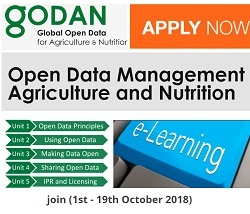Register for free e-course "Open Data Management in Agriculture and Nutrition": DEADLINE: 17th September 2018

Apply now and join (1st - 19th October 2018) GODAN free online course to learn more about managing and using open data in agriculture and nutrition!
The course is delivered through Moodle e-learning platform. Successful applicants are provided with a username and password to login to the system.
A free online course on ‘Open Data Management in Agriculture and Nutrition’ has been developed under the GODAN Action project (see: GODAN Action Curriculum on open data and research data management in agriculture and nutrition). In particular, this e-learning course is the result of a collaboration between GODAN Action partners, including Wageningen Environmental Research, AgroKnow, AidData, the Food and Agriculture Organization of the United Nations (FAO), the Global Forum on Agricultural Research (GFAR), and the Institute of Development Studies (IDS), the Land Portal, the Open Data Institute (ODI) and the Technical Centre for Agriculture and Rural Cooperation (CTA).
The course aims to:
- reach and train a higher number of participants, from a wide range of countries, who can use dedicated online resources (lessons and supplementary learning materials) to study at a time and location convenient for them;
- strengthen the capacity of data producers and data consumers to manage and use open data in agriculture and nutrition;
- be used widely within agricultural and nutrition knowledge networks, in different institutions;
- raise awareness of different types of data formats and uses, and to highlight how important it is for data to be reliable, accessible and transparent.
Course Design
The course is provided in English and lasts for four weeks. It consists of five units (as follows) including 18 lessons. Participants are expected to spend eight hours weekly on average to complete readings and engage in activities such as online tutorials and webinars. It is up to the participants how they schedule their time to go through the course but it is recommended to follow live activities and online tutorials in a timely manner.
By the end of the course, participants will be able to:
Understand the principles and benefits of open data
Understand ethics and responsible use of data
Identify the steps to advocate for open data policies
Understand how and where to find open data
Apply techniques to data analysis and visualisation
Recognise the necessary steps to set up an open data repository
Define the FAIR data principles
Understand the basics of copyright and database rights
Apply open licenses to data
Course Assessment and Certification
Course participants are given short quizzes, assignments and more practical activities within the units. The course ends with a course exam and course evaluation survey. Successful completion is defined as a 60% success rate in the course exam. A certificate of achievement is provided for those who actively participated in the course. Certificates can only be provided electronically.
Who could apply?
The course is open to infomediaries which includes ICT workers, technologist - journalists, communication officers, librarians and extensionists; policy makers, administrators and project managers, and researchers, academics and scientists working in the area of agriculture, nutrition, weather and climate, and land data.
Please do not hesitate to contact godanaction@godan.info for your questions.
Related content:
- Harnessing Open Data to Achieve Global Food Security
- GODAN Action webinar: Agricultural Development - Open Data and the Sustainable Development Goals
- GODAN Webinar - Data Interoperability: The Land Portal experience of open data management
- GODAN's Impact 2014 to 2018 - Improving Agriculture, Food and Nutrition with Open Data
- Recommendations for filling identified gaps in data standards for food and agriculture
- Digital and Data-Driven Agriculture: Harnessing the Power of Data for Smallholders
- Harnessing Open Data to Achieve Global Food Security
- GODAN Publications
- GODAN Advocacy Tools
- GODAN Documentary Web Series
Expert consultation in Bonn on “Ethical, legal and policy aspects of data sharing affecting farmers”
GODAN and the Need for Nutrition Education Programme launch Data Strategy at NNEdPro Summit
- Identify and Manage Data Ethics with a new ODI approach : The Data Ethics Canvas
- 10 marine Research Data Things: a Free self-paced Learning Program

Keep up-to-date by signing up for AIMS News, follow @AIMS_Community on Twitter.
And, thanks again for your interest !

